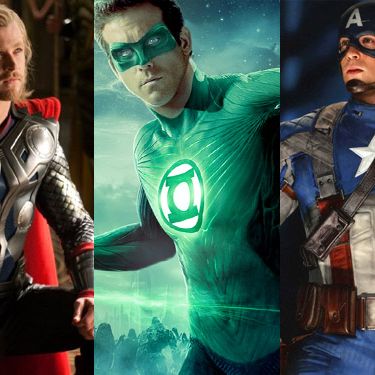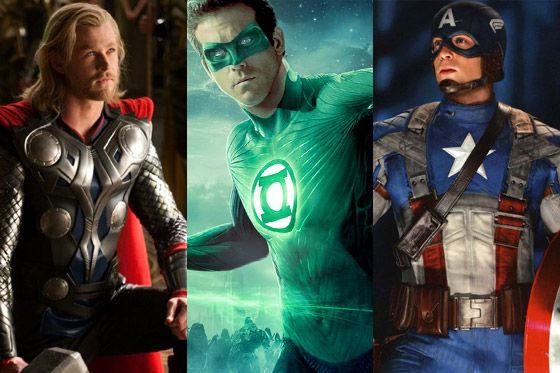

When a movie is one of the highest-grossing films ever made, you can bet it’s going to be widely imitated, so when Christopher Nolan’s gritty, serious The Dark Knight shattered box-office records in 2008, Hollywood took notice. In its wake, Fox announced that it would be rebooting the upbeat Fantastic Four series for a take that was “less bubblegum” than its predecessors, director Breck Eisner declared that his version of Flash Gordon would be “intense, aggressive, gritty and real … it’s not camp,” and Samuel Bayer defended his humorless remake of A Nightmare on Elm Street by saying, “I’m taking this very seriously. I really do look at a movie like The Dark Knight as an inspiration.” The year after The Dark Knight’s dominance was so flooded with producers talking up their downbeat new reboots that io9.com cried out, “Please, No More Dark Superheroes.” Perhaps the site got its wish: In 2011, caped crusaders are finally having fun again.
Unlike recent heroes who agonized over their calling to help people, this year’s superheroes have been eagerly accepting the challenge, from the Green Hornet to Captain America. Their costumes reflect the change: Thor’s is as boldly embossed as a Halloween costume (or a Joel Schumacher–era Batsuit), the Green Lantern looks like a glow worm, and though Bryan Singer clothed his X-Men in more realistic black leather — and had Cyclops crack “What would you prefer, yellow spandex?” — the upcoming X-Men: First Class takes a different approach. “The costumes are blue and yellow … because fuck it,” explained director Matthew Vaughn. “Let’s take it back it the original [comic book].”
Even Marvel, the company that has a plausible, realistic superhero in Iron Man, is starting to introduce magic and fantasy into its continuity. Next year in The Avengers, when Tony Stark fights aliens alongside a Norse God in the hopes of securing a Cosmic Cube, is there really any going back for that character and his formerly real world? Maybe not, but Marvel has concluded that the best thing to do is sincerely embrace that outlandishness, and perhaps that’s why Thor (which features a magical rainbow bridge as one of its settings) is cleaning up overseas, while more subversive superhero takes like Super and Kick-Ass struggled to find an audience.
Maybe, then, the tail of The Dark Knight isn’t as long as we were expecting. Shortly after that film did boffo business, Warner Bros. president Jeff Robinov told The Wall Street Journal that his upcoming superhero movies would be every bit as brooding. “We’re going to try to go dark to the extent that the characters allow it,” he said. The following year, WB released Zack Snyder’s grim Watchmen, which grossed well under its $130 million budget. The year after that, WB had no better luck with Bayer’s Dark Knight–inspired Elm Street reboot, and tabled plans to continue the franchise. This year, their “dark” superhero movie is Green Lantern, a film that boasts a straight-arrow hero, kid-friendly alien sidekicks, and cartoonish special effects (including the huge-headed, villainous Peter Sarsgaard, who’s contracted whatever strain of CG-induced encephalitis Helena Bonham Carter had in last year’s Alice in Wonderland).
It’s true that Nolan has The Dark Knight Rises on deck for next year, but with his trilogy ending (and without the death of Heath Ledger lending a dark pallor over the proceedings), that serious-superhero vibe is about to be crowded out by the would-be franchises that embrace bright colors and family appeal. Maybe The Dark Knight actually wasn’t the most influential superhero movie of the last decade: Maybe it was Iron Man, a property that, while realistic, had plenty of room to go dark (in the comic, Tony Stark battled alcoholism, and the movie could have mined Robert Downey Jr.’s real-life drug problems for even more pathos), yet turned out a first film that was fleet, fun, and lucrative. At the end of The Dark Knight, Batman has to go into hiding; at the end of Iron Man, Stark proudly tells the world that he’s a superhero. Which one would audiences rather be?

